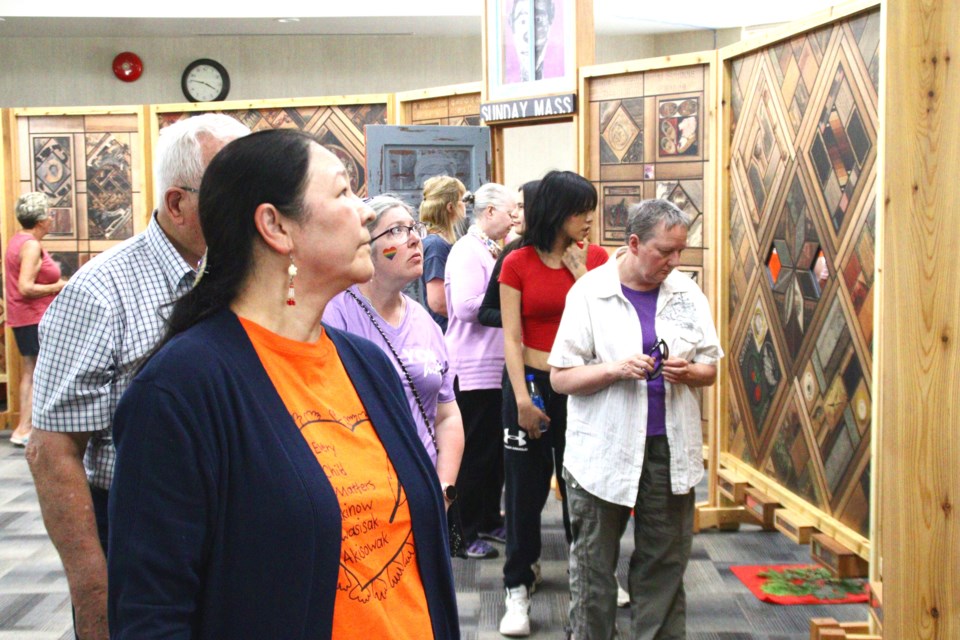Flin Flon’s exhibition of a replica of the famed Witness Blanket is underway. The piece is now open for the public to see at City Hall until late next month.
The exhibit began in earnest with an opening ceremony June 11 at Pioneer Square and City Hall uptown, featuring displays of Indigenous culture, drumming, dancing, smudging and accounts from residential school system survivors and local leaders.
The event featured speeches from both the mayors of Flin Flon and Denare Beach - George Fontaine and Carl Lentowicz - as well as performances by singers, drummers and dancers. Organizers spoke about the importance of showing such a project in Flin Flon and the importance of not only sharing the horrors that took place in residential schools, but also the stories of those who survived them and the culture and traditions that the schools sought and failed to crush.
“We acknowledge the resistance of survivors who advocate for change, the folks who share their stories, either directly or indirectly, of the residential school system. Having the Witness Blanket exhibit provides an opportunity to learn about Indigenous history in the residential school system, to recognize the atrocities of residential schools,” said Doreen Roman, speaking as the representative of the Flin Flon Aboriginal Friendship Centre, one of the event’s sponsors.
Megan Dupas, curator and gallery manager for the NorVA Centre, helped coordinate the event and hopes that it provides a chance for growth and cooperation for the community.
“I want to say that my hope for the Witness Blanket is that it would bring the community together in a spirit of togetherness, learning, empathy and understanding,” said Dupas.
“It already has brought some positive things to our community. Some very meaningful connections have been made already between volunteers, organizations, students and elders.”
Attendees headed from Pioneer Square on to the exhibit at City Hall, located at city council chambers. Shortly after people filed in, a small group of attendees had a revelation - one of the photos on the blanket exhibit, showing a pair of young Indigenous boys at a residential school, showed a man who used to live at Denare Beach.
Agnes Parenteau, a residential school survivor, spoke at the event and viewed the exhibit. Parenteau told the assembled crowd of her experiences in the system and the physical, psychological and sexual abuse she and her classmates suffered as children, starting on her first day after being taken to the school where her hair was cut and treated with chemicals.
“We were told later it was DDT - we know now it was a cancer-causing agent. When I got up in the morning, there were blisters in my scalp,” she said.
Parenteau said that students were not allowed to speak their own language at the school and were forced to learn English, being beaten if they did not follow orders from school staff.
“We would laugh and they would slap you. We would cry and the more you cried, the more they slapped you. We weren’t allowed to share our emotions, we weren’t allowed to laugh, to cry," she said.
Parenteau survived the school and later worked in health care in several Indigenous communities. She said the residential school system has had long-reaching negative impacts on only on survivors, but on their children and grandchildren.
“I worked for 45 years on First Nations reserves and I’ve experienced it. What you see now, it’s called intergenerational trauma - when people have never told their stories, their traumas then correspond to their children and their grandchildren,” she said.
“I saw how destructive it can be. To be a parent, you learn from your mother, your grandmother. We didn’t learn anything about that because all we saw was abuse, physical abuse. I saw the harm that it has done.”
Parenteau sang a song and drummed following her speech, showing the same First Nations culture the schools were designed to destroy.
“My story is very long, that is all I am going to say, but do you see me standing here? Some here are resilient, very strong - that is why I can say this,” she said.
The exhibit will be open until July 22, when a closing ceremony will be held at Pioneer Square starting at 2 p.m. Until then, the exhibit will be available June 12-26 from Monday to Friday at 9 a.m.-4 p.m. for school and class visits and from 4 p.m.-6 p.m. Monday to Friday for public viewing. The exhibit will also be open on Saturdays June 17 and 24 from 10 a.m.-5 p.m. for public viewing.
Hours will change June 27 until the closure day July 22, open from Tuesday to Saturday from 10 a.m.-5 p.m. and being closed for a stat holiday on Canada Day.
The number for the National Residential School Crisis Line is 1-866-925-4419. The line is open 24 hours per day and is meant to provide support for people affected by residential schools.




